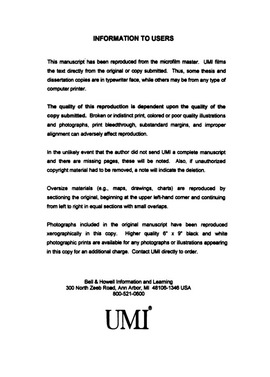| dc.contributor.advisor | Davis, Gwenn, | en_US |
| dc.contributor.author | Cooke, Whitley Ann. | en_US |
| dc.date.accessioned | 2013-08-16T12:30:52Z | |
| dc.date.available | 2013-08-16T12:30:52Z | |
| dc.date.issued | 2000 | en_US |
| dc.identifier.uri | https://hdl.handle.net/11244/5944 | |
| dc.description.abstract | The dissertation establishes a connection between Margaret Cavendish, Duchess of Newcastle's system of natural philosophy and her theory of creativity, her conception of the free use of the imagination. In her natural philosophy, she envisions the creative force of nature that involves matter and motion creating infinite varieties from a prime matter. Analogously, in her fictions she contends that the brain and the mind create infinite variety from thoughts. However, these two theories, often considered separate notions are in fact woven throughout the thirteen volumes of scientific prose, plays, poems, biography, and science fiction she published. In all of them one can find connections, infinite parts connected to a whole, infinite thoughts connected to the imagination, and an infinite possibility of worlds where imagination rules. | en_US |
| dc.description.abstract | The first chapter looks at how Cavendish anticipates and deals with criticism of her work through her many prefaces and introductory epistles to her readers, and explores her defense of herself against aspirations on her authorship, intelligence, and creative abilities. Chapter two deals connects her theories of natural philosophy to her theory of creativity, and shows how she ties the creative motion of nature to the creative motion of the imagination. Chapter three examines how she uses her creative theory in her poetry by employing domestic images of which shows possibilities of creation for women. The conclusion examines the interrelationship of her natural philosophy and her theory of creativity in the Blazing World. Here, Cavendish creates a place where all of her connections between the physical world and the mental world come together, a place were she can show that natural philosophy is just an extension of the imagination. | en_US |
| dc.format.extent | x, 206 leaves ; | en_US |
| dc.subject | Women and literature England History. | en_US |
| dc.subject | Literature, English. | en_US |
| dc.subject | Newcastle, Margaret Cavendish, Duchess of, 1624?-1674. | en_US |
| dc.subject | Creative ability. | en_US |
| dc.title | Severall Coloured Ribbons : | en_US |
| dc.type | Thesis | en_US |
| dc.thesis.degree | Ph.D. | en_US |
| dc.thesis.degreeDiscipline | Department of English | en_US |
| dc.note | Adviser: Gwenn Davis. | en_US |
| dc.note | Source: Dissertation Abstracts International, Volume: 61-02, Section: A, page: 0616. | en_US |
| ou.identifier | (UMI)AAI9962973 | en_US |
| ou.group | College of Arts and Sciences::Department of English | |
